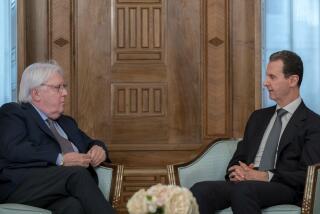Summit Tools of Diplomacy: Snub, Sulk
- Share via
AMMAN, Jordan — At the start of the now-concluded Arab summit meeting here, King Hussein of Jordan pointedly snubbed Palestinian leader Yasser Arafat by not greeting him at the airport.
On Monday night, Arafat attempted to strike a return blow by staying in his room and refusing to come down for dinner with his fellow Arab leaders.
According to Jordanian officials, the chairman of the Palestine Liberation Organization was in a sulk because the summit conference was devoting so little attention to the Palestinian issue.
From the outset of the summit on Sunday night, the Arab leaders’ discussions were dominated by the Iran-Iraq War and the question of Egypt’s re-admission into the Arab League.
‘Most Important Issue’
A few leaders paid rhetorical lip-service to the Palestinians, such as Iraq’s President Saddam Hussein, who called them “the most important issue confronting the (Arab) nations.”
But the conference also included such leaders as King Hussein, who reportedly despises Arafat personally, and Syrian President Hafez Assad, who attempted to destroy Arafat by fostering a civil war among Palestinian groups in Lebanon in 1983.
Arafat attempted to salvage the summit situation, in part by using a little rhetorical inflation of his own to describe his role in the discussions.
After meeting King Hussein on Tuesday, for example, Arafat said they had achieved “more than a reconciliation” despite almost two years of bad blood between them.
“We agreed to coordinate for the sake of our people and our just cause,” the PLO leader said.
Asked at a press conference if he was having policy discussions with Hussein, Arafat replied: “Do you think I have come here for jogging?”
Despite Arafat’s grandiose assertions, the Jordanians remained icily mum about their future relations with the PLO chief. Hussein told a news conference Wednesday that reports of improved relations were “speculations” and added that “our position has not changed.”
Hussein and Arafat concluded an agreement in February, 1985, to work jointly toward a peaceful settlement of the Arab-Israeli dispute.
But a year later, Hussein broke off the coordination after Arafat refused to accept U.N. Resolutions 242 and 338, which guarantee Israel’s right to exist. The PLO objects to the resolutions because they speak of Palestinians only as refugees.
In the following months, Hussein expelled most of Arafat’s deputies from Jordan, leaving only a token presence in the country, which has more than 750,000 Palestinian residents and borders the Israeli-occupied West Bank.
Since the breakdown of the joint Hussein-Arafat efforts, there has been virtually no movement in the so-called Middle East peace process.
Hussein has called for an international peace conference to be attended by the Israelis and all concerned Arabs under the auspices of the U.N. Security Council and its five permanent members: France, China, Britain, the Soviet Union and the United States.
While the United States has also agreed to the idea, the Israeli government is divided, with Foreign Minister Shimon Peres promoting the idea and Prime Minister Yitzhak Shamir unalterably opposed.
The Arab summit endorsed Hussein’s approach--the first time that all of the 21 members of the body have agreed to a formula for peace talks with Israel. But the gulf war is so divisive an issue that the peace plan is largely a dead issue.
An attempt by the Reagan Administration to propose as an alternative a mini-summit of Jordan, Israel, the United States and the Soviet Union was vetoed by the Amman government and never presented to the Soviets, according to Jordanian officials and Western diplomats.
“The Palestinians know what they need to do to get us back on track,” a Jordanian official noted recently. “King Hussein is ready to proceed at any time on the basis of the U.N. resolutions.”
More to Read
Sign up for Essential California
The most important California stories and recommendations in your inbox every morning.
You may occasionally receive promotional content from the Los Angeles Times.










